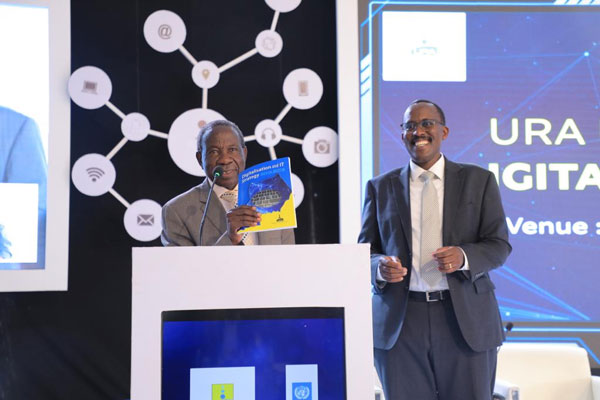
Kampala, Uganda | THE INDEPENDENT | The Minister for Finance and Economic Development, Matia Kasaija, has appealed to the Uganda Revenue Authority (URA) to devise effective tax collection strategies to bolster the country’s economy. His primary aim is to reduce the nation’s dependence on debt, a situation that has become increasingly humiliating for both him and the nation.
During his address at the launch of the authority’s five-year digital transformation strategy, covering the period from 2023 to 2028 on Friday, Kasaija emphasized the need to overhaul the current tax collection system. He expressed his growing weariness of having to seek loans and urged immediate collaboration with the tax authority to address this issue. Kasaijja highlighted that he, as an experienced leader, is no longer willing to bear the burden of seeking loans.
The Minister’s comments come at a time when Uganda’s public debt has surged to USD 20.99 billion in the financial year 2021/22, up from USD 19.54 billion in 2020/21, as reported by the Ministry of Finance in June this year. Uganda’s tax-to-GDP ratio remains stagnant at 13 to 14 percent, falling below the regional average. Kasaijja tasked URA with increasing the tax-to-GDP ratio to 20 percent within the next three years and personally committed to overseeing this endeavor.
He stated, “I am charging you and your staff, with our support, that I want a tax-to-GDP ratio of 20 within another two to three years, not the 14 percent we are currently hovering around. I will oversee this, and even if I am no longer in office, I will leave this directive for my successors.” Regarding the launch of the digitization strategy, John Musinguzi, the URA Commissioner General, emphasized the importance of modernizing the authority’s systems to enhance efficiency in revenue collection.
Musinguzi explained that they have digitized all processes, starting from taxpayer registration, with the aim of expanding the tax base across all sectors. This will make filing returns more timely, payments easier, and ledger reporting more accurate to enhance transparency. He also mentioned that the authority has successfully transitioned from a tier four to a tier three data center, reducing the budgeted costs.
Digitization is seen as a guaranteed way to ensure efficiency and effectiveness in revenue collection. The authority is committed to continuously introducing new technologies within the allocated budget. For taxpayers, Thaddeus Musoke, the acting chairperson of the Kampala City Traders’ Association (KACITA), highlighted the benefits of the digitization agenda.
He pointed out that it will reduce misunderstandings between taxpayers and revenue collectors by minimizing human errors in the revenue collection processes. Musoke also noted that the strategy will save them time lost in laborious revenue processes and level the playing field for competition in the business sector. Favoritism will be eliminated, and taxation will be fair, ensuring everyone pays their equitable share of taxes while reducing corruption tendencies.
****
URN
 The Independent Uganda: You get the Truth we Pay the Price
The Independent Uganda: You get the Truth we Pay the Price




For sure that is good tax collectors are involved in the theft.